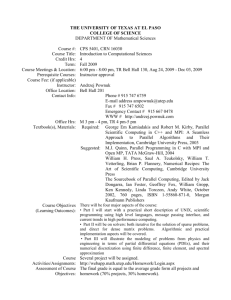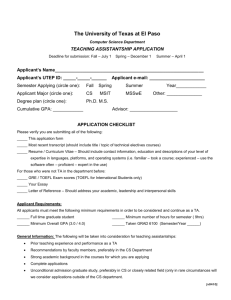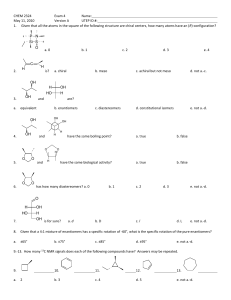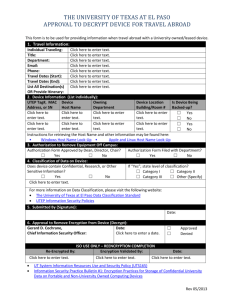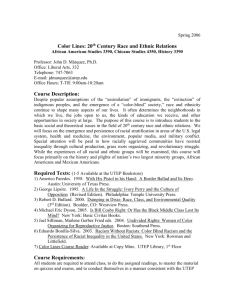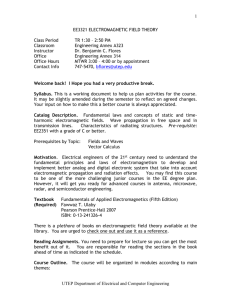Survival Guide for First-Year Students in Science and Engineering
advertisement
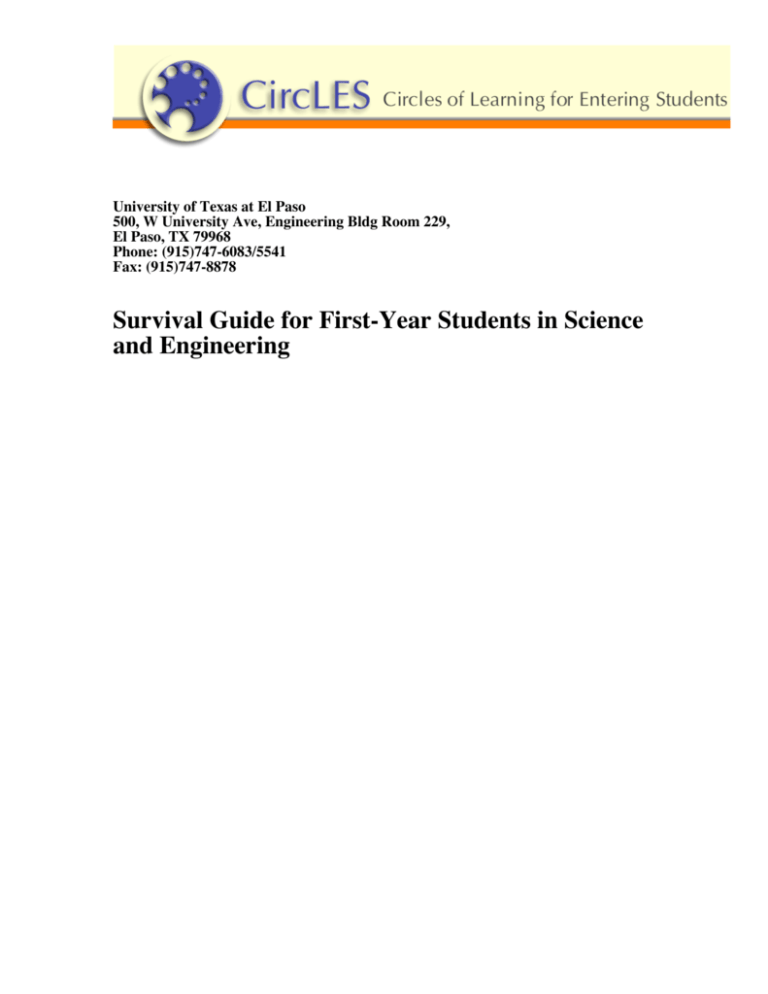
University of Texas at El Paso 500, W University Ave, Engineering Bldg Room 229, El Paso, TX 79968 Phone: (915)747-6083/5541 Fax: (915)747-8878 Survival Guide for First-Year Students in Science and Engineering Welcome! 4 CircLES Students 5 Undergraduate Science & Engineering Programs at UTEP 5 Clusters (Learning Communities) 7 Advising 7 Application for Declaration of Major 8 Part-time or Full-time? 9 What do the numbers mean? 10 GPA & GPA Calculation 10 Dean’s List 12 Probation & Suspension 12 Registration Information 13 Building Information 20 Academic Services Building 20 Location and Contact Information for Departments in Engineering and Science 22 WHERE DO I GET HELP FOR MY CLASSES? 24 Information about Science and Engineering 27 Student Associations 28 Student Associations in Engineering 28 Student Associations in Science 31 Career Services 32 Office of Special Events 33 Athletics at UTEP 34 Communication on Campus 36 2 DISCLAIMER The information provided in this guide has been compiled from various sources on the UTEP campus and the rules and policies given are subject to change without prior notice. For the most up-to-date information, please contact the department or office providing the service for which you are looking for. 3 Welcome! CircLES would like to welcome all engineering and science first-year students to the University of Texas at El Paso (UTEP). You have made a great choice in opting to come to UTEP to pursue your goals and dreams. The Circles of Learning for Entering Students Program (CircLES) is designed to help you, the incoming students in science and engineering, succeed in the important freshmen-level courses that are critical to the rest of your college education. The CircLES program is also dedicated in its effort to make your transition from high school to college as smooth as possible. The goal of the CircLES program includes familiarizing the incoming students with UTEP, its campus and policies, the CircLES program and its procedures, the Colleges of Engineering and Science, and the students' future departments. We also provide advising and registration services for incoming first-year students to further facilitate their transition to UTEP. This manual is intended to help you understand your road to graduation at UTEP. We have tried to address all issues that we believe will be foremost on a student’s mind as he/she walks through UTEP’s door the first time. If there is any particular issue that we do not address in this guide you want to know about, do contact us and we will try our very best to give you the right direction. Again, please feel free to contact us with any issues that might be of concern to you. We shall be more than glad to offer assistance. Wishing you very good luck on your journey to success. Welcome to UTEP and CircLES! 4 CircLES Students Who is a CircLES student? All incoming first-year students in Science and Engineering are part of the CircLES program. Any student admitted to UTEP and who intends to pursue engineering or science at UTEP is classified as Pre-Engineering (PREE) or Pre-Science (PRES). Students remain classified as Pre-Engineering (PREE) or Pre-Science (PRES) until they fulfill the CircLES requirements* to be eligible to apply for a change of major. * To be eligible to apply for a change of major you must be enrolled in Math 1411 (Calculus) I and have a cumulative GPA of a 2.0 or above. Although these are the minimum requirements, it does not guarantee you automatic acceptance into the major of your choice. Undergraduate Science & Engineering Programs at UTEP ENGINEERING Civil Engineering Computer Science Electrical and Computer Engineering Industrial Engineering Materials and Metallurgical Engineering Mechanical Engineering SCIENCE Biology Chemistry Environmental Science Geology Geophysics Mathematics Microbiology 5 Physics Psychology The time line pictured below shows your path from your first day at CircLES Orientation until the time you apply for a change of major. During your stay with CircLES, you will take classes from the UTEP core curriculum and/or a science or engineering class every semester. Electrical Eng. Mech & Indust. Eng. Civil Eng. MME Eng. Comp. Sci. Orientation Biol/MicroBiol Chemistry Env. Sci. Geology Mathematics Physics First-Year Students Pre-Engineering Pre-Science Engineering Majors Science Majors CircLES Time line for Incoming First-Year Students 6 Clusters (Learning Communities) A CircLES cluster is a group of courses that a student takes based on how he/she places in English and mathematics courses at UTEP. Placement in English and math classes is based on the student’s performance on the “Accuplacer” and TSI tests. CircLES groups all PREE and PRES students into classroom "circles" of approximately 25 people who study English, math, Seminar in Critical Inquiry (UNIV 1301), and/or science/engineering together under a team of professors. The advantage of being in a cluster is that all the students in your English class will be in your math class and in your Seminar on Critical Inquiry and in your engineering/science class as well. Since the professors work together, they are better able to coordinate their assignments and follow your progress in all your clustered classes. CircLES, however, isn't just about professors working together; it's also about students learning and studying together. CircLES students spend a lot of time with one another. Because they study all disciplines in small groups, students learn to rely on each other. No engineering or science discipline involves individual work. Most careers in academics or in industry involve group work and collaboration. In the cluster classes, there is a particular emphasis on group work and the dynamics involved in working together. All PREE and PRES students are clustered for their first two semesters (i.e., fall and spring semesters). Note: If a student applies to change his/her major and is accepted into the department of choice during the first two semesters, he/she will not remain clustered the following semester. Advising Advising for both PREE and PRES students is mandatory every semester prior to registration. During your advising session, your CircLES advisor will go over the classes you have taken and guide you as to what classes you should take. The advisor will also answer any questions and concerns you might have. 7 To set up an appointment for a group advising session you need to contact the CircLES Office at 747-5541 or 747-6083. You can also come by our office in the Engineering Building room E-229. Remember, if you are not advised you will not be able to register because you will have PREE or PRES academic advising holds placed on your record. Application for Declaration of Major One of the most frequently asked questions in the Circles office is “When can I change my major?” In order for PREE or PRES students to apply to declare their major, they must meet the following criteria: 1. Be enrolled in Math 1411 2. Have an overall GPA of a 2.0 or above If you meet these requirements, your CircLES advisor will send you an email that will inform you of your eligibility. We will have your change of major form ready for you to pick up at the CircLES office so you can take to your department of choice. If you do not get an email but meet the criteria, then come by the office, and we will be more than happy to issue you a change of major form. If you have decided that you want to change your major to a department other than in the Colleges of Science or Engineering, then you need to come to the CircLES office and have your advisor fill out and sign the change of major form for you. Your CircLES advisor will also let you know what the next steps are in order for you to proceed with the change of major process. 8 Part-time or Full-time? We refer to part-time and full-time status to describe the course load a student takes per semester. Certain offices like Financial Aid and Scholarships may require you to take a specific amount of hours to classify as full-time status. Depending on the semester you are attending, the hours that qualify you as either part-time or full-time will vary. The following table shows you what constitutes part-time or full-time loads. Part Time Fall & Spring Maymester & Wintermester Full Time Part Time Full Time Part Time Summer Full Time 11 or fewer credit hours per semester 12 or more credit hours per semester Max. course load is 21 hours with GPA of 2.0 or above 2 hours or fewer per term 3 hours or more per term Max. course load is 6 hours with GPA of 2.0 or above 5 or fewer credit hours 6 or more hours per term: 3 hours Summer I and 3 hours 8 week 3 hours Summer II and 3 hours 8 week or 3 hours Summer I and 3 hours Summer II Max. course load is 9 hours with a GPA of 2.0 or above Be aware that permission from the academic dean from Engineering or Science is required if you wish to enroll for more than the maximum course load established by UTEP. Dead Day What exactly is dead day? Dead day is the Friday before finals during the fall and spring semesters. No classes are held on dead day. Students take advantage of dead day to start studying for finals week. Census Day Census day is the 12 day period starting the first day of class in which a student can drop a class without getting a “W” (also know as a withdraw on their transcript). Do keep in mind that a “W” is counted as an attempt to pass a course. 9 Limits on Undergraduate Course Enrollment In most cases, a student has three opportunities to pass a course. If a student gets a “W”, “F”, “D” or “P”, they must retake the course. After a student has exhausted his/her third try, then he/she will need to ask for permission from their academic dean to enroll in a course for a fourth time. If permission is not granted, then the student will have to complete the course at another institution. A monetary penalty may be applicable to tuition fees if a student takes a course a 3rd or 4th time. For more information about this policy contact You will not be allowed to retake a course if you received a letter grade of a “C” or higher. What do the numbers mean? If you look at schedule for classes or the course catalog, you may wonder what all those numbers next to the course names mean. To help you understand the course numbering system at UTEP, lets look at the following example. ENGL 1311 Expos. English Composition Credits: 3.0 The second digit of the course number represents the amount of credit hours the course is worth. The first digit of the course number represents the classification. 1=Freshman 2=Sophomore 3=Junior 4=Senior 32142 LECT MWF 8:30-9:20am MNRS 201 STAFF This will tell you if a class is a lecture or a lab. If you want to know where you class will be held, this is the place to look. You can also check out who will be teaching the course. If it says staff, then the department has not identified who will be teaching the course. The section call number is unique to every course here at UTEP. This is the number you will use to register for courses. GPA & GPA Calculation 10 As you may all know, Grade Point Average (GPA) measures your academic performance in college. Some employers may use GPA as a key factor when hiring college graduates. Therefore, it is extremely important for you to maintain a good GPA throughout your college career. There are two types of GPA you should be aware of. One is Term GPA, which computes GPA of the courses you take each semester. Overall, GPA, on the other hand, is the GPA you have accumulated for all the semesters you have attended UTEP. Both Term GPA and Overall GPA are shown on your grade report at the end of each semester. What is a good GPA? Even though we have told you that a GPA of 2.0 or above will keep you off probation and suspension, it is best you maintain a GPA as high as possible. The higher your GPA the better. This will open more doors of opportunity when you apply for co-ops, internships or post graduation jobs. How do you calculate GPA? In order to calculate your GPA, you need to know what grade points are and how they are used in GPA calculation. Every letter grade is assigned a fixed numerical value. This numerical value is what we refer to as grade points. The following table shows the grade points for all possible letter grades. Grade Point per Grade Meaning Semester Hour A B C Excellent Good Average 4 3 2 D Below Average but passing 1 F Failure 0 Let us now assume that you received the following grades for the Fall semester. Course Math 1411 Chem 1305 Chem 1105 Engl 1312 Hist 1301 Grade Grade Points Semester hours Grade Points X Semester Hours A 4 4 16 B 3 3 9 A A B 4 4 3 Total 1 3 3 Sum = 14 4 12 9 Sum = 50 The 2nd digit of the course number represents the number of credit hours each course is worth. 11 To compute the overall GPA, you need the sum of total semester hours, which is 14, and sum of grade points x semester hours which is 50. You now divide 50 by 14 and this gives you a GPA of 3.57. Please note that the following grades are not included in GPA calculations. Grade Meaning I S Incomplete Satisfactory, Pass/Fail course U P Unsatifactory, Pass/Fail course In Progress W Withdrawal Transfer credit or Credit by Examination Satisfactory Satisfactory Satisfactory Satisfactory Unsatifactory Satisfactory Unsatifactory CR A* B* C* D* F* S* U* N Temporary grading notation, grade not reported by faculty Comments Some courses may be taken as a Pass/Fail basis, check UTEP catalog for conditions Counts as an attempted try to pass course These grades are usually reported for Pre-College courses such as Math 0310,0311, ENGL 0311,0310 Contact faculty or department that offered the class or contact Records at 747-5544 for more information Dean’s List Making the Dean’s List is definitely a good thing. To make the Dean’s List you have to earn a 3.5 GPA at the end of the semester and have taken at least 12 credit hours. Probation & Suspension What is Probation? Academic probation is a term used to describe a student’s standing when the GPA goes below the minimum GPA of 2.0. What happens now? Probation is the term used when a student’s GPA falls below a 2.0. The student will need to get permission from the dean of his/her college to re-enroll. How does a student get off of Probation? 12 A student can get off probation by bringing up the GPA to a 2.0 or above. At this point, the student will be eligible to re-enroll for the upcoming semester without prior permission from the dean. What is Suspension? Suspension is the academic term used to describe a student who is on academic probation and whose term GPA is below a 2.0. When this happens, a student will be suspended for one semester and will not be able to re-enroll until after the one semester is up. Then the student can petition their department for reinstatement. This means that a student will need permission from the dean of his/her College to re-enroll. What happens if a student remains on suspension? One of two things could happen: Academic Suspension for One Year If a student has been suspended for one semester, returns to UTEP for one semester and still has less than 2.0 GPA, then the student will be suspended for one year, which means that the student will not be allowed to register for any classes at UTEP for one full year. After the one year is over, the student can choose to petition his/her department for reinstatement. If approved, the student will be allowed to re-enroll for one semester on academic probation. The dean of the student’s college may also impose certain restrictions such as the amount of hours the student can register for or set a certain GPA standard the student must achieve for the semester. Academic Suspension for Two Years If a student still does not do well in the semester following the one-year suspension, then the student will be suspended for two years. After the two full years, the student can choose to petition the department for reinstatement. If approved, the student will be allowed to register for classes probably with some restrictions and expectations as mentioned above. How does a student get out of suspension? 1. Meet with the academic dean after the suspension period. 2. Maintain an overall GPA of 2.0 or above. Registration Information You have finally decided what classes you want to take and you are ready to register. You can register three ways: Online using Goldmine: We highly recommended you use Goldmine. Why? Well, it is easy and user friendly; plus you can print out your schedule right after you’ve registered. Before you begin the registration process, you will need to have set up your UTEP email account. To set up a UTEP email account go to www.webmail.utep.edu, and input the 13 information that the system asks you for and submit the information. If you have any problems setting up your email account, contact the UTEP helpdesk at 747-5257. You should also have your schedule ready with corresponding course request numbers (CRN) on hand to input into the system. 1. 2. By phone: Phone registration is also a good alternative but there are some drawbacks. For example, if the system is busy, you will have to call back. You also have a time limit of 15 minutes to complete the registration process. After those 15 minutes are over, the system will hang up on you. You also have to make sure that you confirm each course you add or drop because if you don’t and you hang up or you are timed out, you will lose your schedule, and that means you have to re-start the whole process again! 3. In person: If you are thinking of opting for in-person registration, please be aware that in-person registration is open for late registration only. There are some exceptions, for example, if you have priority registration or special permission to register early. Other than that, regular registration has to be done through Goldmine or by phone. If you miss regular telephone registration, then you have the option of doing in-person registration. However, expect to pay extra fees for doing so. If you register during late registration, you will be charged a fee of $30. If you wait until classes start to register in person, then expect to pay an extra $50 towards your tuition. Just keep in mind that these fees are subject to change…………….REGISTER ON TIME! Here is an example of a course request number as shown in the UTEP schedule of classes: MATH 1411 Calculus I 31275 LECT MTWR Credits: 4.0 9-10:20 am LART 000 STAFF This is a course request number (CRN). Each course has a unique CRN and these are the five digit numbers you will need to input when you register on Goldmine or on the phone. Now you are ready to begin the registration process. Goldmine Registration Instructions 1. Go to www.utep.edu 14 2. At the bottom of UTEP webpage, click on “My UTEP.edu”, this will take you to the following screen: 3. Type in your UTEP emailing account username and password and then click sign on. If you do not know your UTEP emailing account username and password, call the UTEP helpdesk at 747-HELP (4357) and they will provide you with this information. 4. At the top of your “My UTEP.edu” homepage, click on “Goldmine” 5. This will take you to the “Goldmine” main menu: 15 6. Click on the “Student Services & Financial Aid” link. This will direct you to the “Student Services & Financial Aid” main menu, click on the “Registration” link. 7. Under the “Registration” menu, you’ll have several helpful links. Choose the “Register” link to proceed with the registration process. 8. Next, you will have to select the TERM. Choose Summer 2005 or Fall 2005 according to the semester that you are planning to register for and click submit. 9. A new screen appears where you will see boxes under the title “ADD CLASSES”. 10. Every box will accept a valid 5 digit CRN number for a course. Look at your class schedule (paper-copy or online schedule) and choose the CRN (section number) for the classes you have been advised to take. 11. Enter the CRN number for the classes that you want to take and click submit. 16 12. Wait for the system to process your request. If you were registered for the classes, you will immediately be able to see them on the same page. 13. To view your class schedule after registering, go back to the main “Registration” menu, select the “Student Schedule by Day and Time” or the “Student Detail Schedule”. Either link will show you what classes you have registered for along with time/day and location information for each class. If a class is not listed, you are NOT registered for the class. 14. You can also go by the UTEP Student Records Office located on the first floor of the Academic Services building, to obtain a copy of your schedule. Checking to see which classes are open If you want to know if the classes you have been advised to take are open, you can use Goldmine to check. It’s real easy just follow these simple steps: 1. On the “Registration” menu, click on “Look up Classes to Add”. 2. This will take you to another screen that will ask you to select the TERM for which you are going to register for. Scroll down, select term and click submit. The following screen will appear: 17 3. To do a class search, select the course subject under “Subject”, type in the course number in the “Course Number” box and click on the “Class Search” button. For example, if you wanted to look up HIST 1301 then you would scroll down on the “Subject” box to select History and then you would type in 1301 in the “Course Number” box, click on “Class Search” to generate a listing of all HIST 1301 sections being offered for a particular semester. The following is an example of what you see after doing a class search. To check if it is open, look at the Cap, Act and Rem columns. The Cap refers to the class capacity, Act refers to actual number of students already registered in the course and Rem refers to number of remaining seats. If the Rem column has a 0 or a negative number listed, this means that the class is closed and you would need to select another section. You can also check the “Select” column on the far left . If it has a “C”, it means the class is closed. If it has a box, that means the class is open. You can also register for classes using this link. Here is how: 1. Follow the class search instructions above for the course you are interesting in registering for. Select the course section that is open by clicking on the checkbox in the “Select” column. Remember if it has a “C”, the class is closed. 18 2. Scroll down to the bottom of the page and click on “Add to worksheet”. This automatically adds the course section number to the registration worksheet. If you want to add another class, simply click on “Class Search” and look up the availability of other courses you want to add, select desired sections and add them to your worksheet. 3. Once you are done adding courses to your worksheet, click on “Register” and the system will register you into the classes that were on the worksheet. Possible Registration Errors It might be possible that when you are trying to register you might encounter registration errors. The following are some possible registration errors you might see. 1. “Pre-requisite & Test Score” error: A student might get these errors if they don’t meet the minimum requirements to take a course. If you do have the minimum requirements but still get this error, contact the department of the course that is giving you this error. They will be able to help you with this problem. 2. “Closed Section”: If you get this message, the class you are trying to register for is closed and you need to find another available section. If all sections for a course are closed you can either: wait to take it another semester or get a “closed class permission waiver” form at Records and contact the department of the closed class and request a “closed class permission waiver”. 3. “Time Conflict”: If you get a “time conflict” message, it means that you are trying to register for a class that time conflicts with another course you have already registered for. In this case, you must select another course that does not conflict with your existing schedule. 4. “Link Error”: A “link error” message occurs if you are trying to register for a course that requires concurrent enrollment with a lab. For example, ENGR 1401 consists of a lecture and a lab. If you try to register for the lecture without a lab, you will get a “link error”. If this happens, go back and look at the paper or online schedule to select a lab along with the lecture. If you elect to use phone registration, complete the following steps: 1) Make sure you are using a touchtone telephone and dial (915) 545-1145. If the lines are busy hang up and try again. Don’t worry; you have plenty of time on your day to register. 2) Once you’ve accessed the system, you will be given some options to choose from and you will be given step-by-step directions as to what do next. Make sure to listen to the entire message. 3) Remember you have 15 minutes to complete your call. 4) Confirm each course you’ve added or dropped. Again, the system will guide you through to complete the registration process. 19 If you elect to use In Person Registration, complete the following steps: 1) Go to the Academic Services Building and proceed to the Records counter. You will need your student ID card or valid driver’s license or state ID card. 2) Fill out a registration form, and include the CRN’s for the courses you want to register for. 3) Submit both the registration form and your ID card to Records. They will process the registration for you. 4) After they register you, they will give you a copy of your schedule. Building Information There are many buildings on campus and you will be able to get a comprehensive list (based on alphabetical listing) on every class schedule (summer, fall or spring) that comes out at UTEP. This will be on the last page of the schedules with the map of campus provided right next to it. This section will provide you with an example of where to find the building information for your classes as well as an informal list of locations that we believe you will frequent in your very first semester here at UTEP. Bellow is an example of a course as shown in the UTEP schedule of classes: ENGL 1311 Expos. English Composition(C) Cr: 3.0 15740 LECT MWR 8:30-9:20 am HUDS 300 STAFF This is the building information of this class. Each course has an abbreviated building name. In this case, the building name is Hudspeth Hall. This class will be held in Hudspeth Hall, third floor room 300. The New Academic Services Building This is the new building located on the corner of Hawthorne Street and Schuster Street. The great new feature about the New Academic Services Building is that it functions as a “one stop shop”, where you can get many things done under one roof. Among the many offices here, you will find the: 1) Records office: You need to go there to get your Student ID, to get your schedule of classes, to withdraw from a class, to register in-person for a class, etc.(Phone:(915)747-5544) 2) Cashiers: You need to go there to pay for your tuition fees, traffic tickets (!!), payments for transcript requests, etc. (Phone:(915)747-5116) 3) Traffic Office: You need to go there to get your parking decals, and to address any other campus traffic issues. (Phone:(915)747-5724) 20 4) Academic Advising Center (2nd floor): You need to go there for TSI Advising (if required). (Phone:(915)747-5290) 5) Admissions Office: You might need to go there regarding admission issues (such as pending high school diploma) or to get information regarding any transfer credits that you have or intend to transfer from EPCC or any other institution. (Phone:(915)747-5890) 6) Registrar’s Office: You need to go here to get a printout of your schedule, for a change on your address or name. Also, upon graduation here is where you will pick up your diploma. (Phone:(915)747-5550) 7) Financial Aid office: If you want more information on how to apply for financial aid contact the Financial Aid office. (Phone: (915)747-5204) 8) Scholarship office: You need to go here if you want information on eligibility requirements and application deadlines regarding academic scholarships. (Phone: (915) 747-5478) 9) Miner Gold Card Office: If you need to get a new student ID or you lost yours, you can stop by at the Miner Gold Card office. (Phone: (915) 747-7334 University Union The Union building has two wings, the West and the East. This building houses many offices just like the Academic Services Building. The West wing houses the Career Services offices, and the Women’s Resource Center. The East wing of the Union, houses the Post office, Office of Special Events, Office of International Programs (OIP), the Student Government Association (SGA) office, the Union Food Services (providing you a variety of food options), EEO office, etc. University Library The UTEP library provides information regarding a wide variety of subjects via books, journals and magazines and so much more. We also have a computer center at the library. It also provides studying space for groups and individuals. All UTEP students can access the library as long as you have a current validated UTEP student ID. 21 Location and Contact Information for Departments in Engineering and Science Engineering Dean of Engineering, Engineering Bldg, Room 230, Phone:747-5460 Civil Engineering: Engineering Bldg., Room E-201 (Phone: 747-5464) Computer Science: Computer Science Bldg., Room 234 (Phone: 747-5480) Electrical and Computer Engineering: Engineering Bldg., Room E-301 (Phone: 747-5470) Mechanical and Industrial Engineering: Engineering Bldg., Room E-101 (Phone: 747-5450) Metallurgical and Materials Engineering: Engineering Bldg., Room M-201 (Phone: 747-5468) Science Dean of Science, Bell Hall, Room 100, Phone:747-5536 Biological Sciences: Biology Bldg., Room 226 (Phone: 747-5844) Chemistry: Physical Science Bldg., Room 201 (Phone: 747-5701) Environmental Science: Geology Bldg., Room 209 (Phone: 747-5554) Geological Sciences: Geology Bldg., Room 101 (Phone: 747-5501) Mathematical Sciences: Bell Hall Bldg., Room 124 (Phone: 747-5761) Physics: Physical Science Bldg., Room 210 (Phone: 747-5715) 22 Medical Programs Institute: Jayne Pynes, ACES XP Lower level of Classroom Building, (Phone: 747-6260) 23 WHERE DO I GET HELP FOR MY CLASSES? UTEP offers free tutoring at different locations to currently enrolled students. Tutoring and Learning Center (TLC) The Tutoring Learning Center provides academic support for many different subjects. The TLC is located in the UTEP Library on the 3rd floor room 300. Tutors are highly successful students, who have completed training to become nationally certified with the College Reading and Learning Association. Tutoring can help you succeed in your studies. They also offer workshops in various subject areas, study skills and standardized test preparation. Language classes are fun and educational. The Special Needs Room makes available computer equipment with adaptive technology. Services Tutoring Rooms Math Room Writing Room Business Room Science Room Languages Room Special Needs Room Learning Assistance Lab Workshops Sign up in the Library on the 3rd Floor room 300. You can also sign up by Email or by Fax. Writing Workshop Math Workshops Thesis Workshops Study Skills Standardized Test Helpful Accuplacer websites and help Accuplacer The Math Room Study Groups Regularly scheduled review sessions will b e held upon the request of 10 or more students. Sign up beginning the first day of class. Send the TLC the hours that you will be available or come by the Tutoring Center for more information. Send TLC the hours that you will be available or come by the Tutoring Center for more information. Math 0311 Intermediate Algebra Math 1508 Pre Calculus Math 1320 Math for Social Sciences I Math 2301 Math for Social Sciences II 24 Math 1411 Calculus I Math 1312 Calculus II PHYS 2420 Introduction to Mechanic Also some advanced Math, CE, CS, EE, and ME courses. Days, times, and rooms for all study groups vary every semester Information Location: Library Bldg., 3rd Floor, Rm. 300 Web: http://academics.utep.edu/tlc/ Phone: (915) 747-5366 Fax: (915) 747-5486 The Academic Center for Engineers and Scientists (A.C.E.S.) The Academic Center for Engineers and Scientists (A.C.E.S.) operates three main centers located in the heart of the Science and Engineering complex on the UTEP campus. Each center serves the needs of Science, Engineering and Math (SEM) students by providing a multi-functional, state-of-the-art facility. Free tutoring is ongoing throughout the day in courses such as math, physics, chemistry, biology, and engineering. The purpose of each center is to provide a supportive, dynamic environment where students feel comfortable working together and sharing ideas within and across disciplines. The centers also serve as an important resource for students by inviting speakers from on and off campus to do workshops, presentations and training sessions. In addition, the student team maintains a comprehensive library of tests, study guides, as well as information regarding graduate school and employment opportunities. Classroom ACES (Classroom Building 101) The Classroom Building ACES was founded in 1997 and occupies approximately 5,000 square feet and serves as a resource hub to enhance Science Engineering and Math (SEM) student academic, personal and professional growth. Physical Science The Physical Science ACES was founded in 2000, occupies approximately 4,500 square feet and focuses on developing tools and support services for students taking physics and chemistry courses. eXPansion (Also known as ACES XP) The Classroom Building Lower Level Expansion was opened in the spring of 2002 to provide more quiet study space and to be inviting to students studying Biological Sciences. The center is another 5500 square feet that has group study rooms, quiet study carrels, a tutoring center, and a meeting/classroom for student-centered activities. Math ACES The Math ACES was officially opened January 2004. Its main objective is to support students in math. This lab contains special programs that cater to Math students such as Matlab, geometry sketch path, etc. 25 ACES Resources ACES has a bank of past tests from courses you may be taking, and a large collection of course books. The ACES centers on the first floor of the Classroom Building and the Physical Science Building include a library of past tests for many of your classes. In addition, the Classroom Building ACES has ACES Instructor Information and/or notes. There are always tutors available to assist you, and our study areas and computers are readily available as well. Students have access to amenities such as a fax machine, typewriter, copy machine, desktop and laptop computers, scanner, and multi-media equipment, in addition to the other resources. Information Location(s): Classroom ACES (Classroom Building 101) Physical Science (2nd Floor) Expansion (Classroom Building 001) Math (Bell Hall 130) Web: http://www.utep.edu/aces Phone(s): Clasroom ACES: (915) 747-8727 Physical Sc. ACES: (915) 747-8442 ACES XP: (915) 747-6481 Math: (915) 747-8814 26 Information about Science and Engineering Are you confused about what engineering career to pursue? What about a science career? What types of opportunities are available? Here are some helpful links to help you figure out what major is right for you. Engineering American Association for Engineering Education http://www.asee.org/ Accreditation Board for Engineering and Technology (ABET) http://www.abet.org/ Biology http://www.biology.colostate.edu/Resources/whattodo.htm http://www.utexas.edu/student/careercenter/careers/biology.pdf Environmental Science http://www.career.ua.edu/PDF/Environmental%20Science%20_updated%202003_.pdf Chemistry http://www.uncwil.edu/stuaff/career/Majors/chemistry.htm http://web.princeton.edu/sites/career/undergrad/Start/majors/Chemistry_careers.html Geological Sciences http://www.uncwil.edu/stuaff/career/Majors/geology.htm http://career.sdsu.edu/MAJORS/links/geology.htm Mathematics http://www.math.hope.edu/links/careers.htm http://web.stlawu.edu/career/math.htm Physics http://www.gsu.edu/~wwwcjs/students/physics.html http://dept.physics.upenn.edu/undergraduate/whatdo.html All Majors http://career.berkeley.edu/Major/major.stm http://www.jobweb.com/resources/profile.asp 27 Student Associations Student associations are an integral part of your academic endeavors. Student associations, especially in your area of concentration, give you a feel for what industry needs are and help you understand the requirements and attitudes of industry and research. Student associations will also be able to provide you with information and opportunities to travel to various major-related conferences to widen your perception of the world outside your academic campus. It is highly advisable for you to join student organizations of your interest very early in your academic career so that you can take full advantages of all the resources that are offered. Here’s a list of student organizations available to science and engineering majors. (Source for all engineering organizations information: Engineering Programs Office; (915)747-8822; http://www.utep.edu/epo/) Student Associations in Engineering CIVIL ENG INEERING ORG ANIZATIONS ASCE-- American Society of Civil Engineers The American Society of Civil Engineers gives students the opportunity to network with other civil engineering students and practicing civil engineers. ASCE members can also participate in competitions and contests such as the Annual Concrete Canoe and Steel Bridge competitions. Student members are eligible for scholarships, as well. The ASCE office is located in room E-219; (915) 747-6910. CE-- Chi Epsilon Chi Epsilon is the Civil Engineering Honor Society dedicated to the purpose of maintaining and promoting the status of Civil Engineering as an ideal profession; (915) 747-5464. COMPUTER SCIENCE ORGANIZATIONS ACM-- Association for Computing Machinery The Association for Computing Machinery is an international scientific and educational organization dedicated to advancing the arts, sciences, and applications of information technology. ACM functions as a locus for computing professionals and students working in the various fields of Information Technology. The purpose of the UTEP ACM student chapter is to provide a forum for students interested in computer science to discuss current technologies and computing issues. The ACM office is located in room CS-113a; (915) 747-8920; acm@cs.utep.edu 28 UPE-- Upsilon Pi Epsilon Upsilon Pi Epsilon is the International Honor Society for the Computing Sciences. Its objectives are to promote high scholarship and original investigation in the branches of the computing science; (915) 747-8012 ELECTRICAL AND COMPUTER ENGINEERING ORGANIZATIONS IEEE-- Institute of Electrical and Electronic Engineers The Institute of Electrical and Electronic Engineers is a non-profit technical society devoted to foster technical innovation. IEEE is the largest professional organization and disseminator of technical and scientific literature in the world. The IEEE office is located on room E-337. Membership applications available online: www.ieee.org; (915) 7478686. HKN-- Eta Kappa Nu Eta Kappa Nu, the National Electrical Engineering Honor Society, promotes academic excellence among electrical engineering students. The HKN office is also located on room E-337. Its members are distinguished leaders in the Electrical Engineering Department. HKN membership applications online: www.ece.utep.edu; (915) 747-8686 hkn@ece.utep.edu INDUSTRIAL ENGINEERING ORGANIZATIONS IIE-- Institute of Industrial Engineers The Institute of Industrial Engineers is interested in advancing the students' education beyond the classroom. The focus of this advancement is to give the students other qualifications and knowledge, through certifications and conferences, in order to further their career opportunities. In the process, the students of IIE grow and share in their experiences and build better relationships with their fellow students. IIE membership application online: www.iienet.org; (915) 747-5460 Alpha Pi Mu 29 Alpha Pi Mu is the National Industrial Engineering Honor Society. Its goal is to confer recognition upon the Industrial Engineering students who has shown exceptional academic interests and ability in the field of Industrial Engineering; (915) 747-8012 MECHANICAL ENGINEERING ORGANIZATIONS ASME-- American Society of Mechanical Engineers The Society of Mechanical Engineers is dedicated to improving job skills, performance, and personal growth, while staying abreast of technology changes; (915)747-5460 SAE-- Society of Automotive Engineers The Society of Automotive Engineers will provide technical information and expertise to be used in designing, building, operating, and maintaining self-propelled vehicles for use on land, sea, air, or space; (915) 747-5460 Pi Tau Sigma Pi Tau Sigma is the Mechanical Engineering Honor Society whose goal is to establish a close bond of fellowship, which will result in mutual benefits to who manifest a true interest in Mechanical Engineering by their academic achievements; (915) 747-5460 METALLURGICAL AND MATERIALS ENGINEERING ORGANIZATIONS TMS-- The Minerals, Metals, and Materials Society The Metallurgical Society promotes global science and engineering professions concerned with minerals, metals, and materials; (915) 747-5468 AFS-- American Foundry Society The American Foundry Society provides information concerning state-of-the-art casting techniques. National chapter is over 100 years old; (915) 747-5924 ASM-- Alpha Sigma Mu Alpha Sigma Mu is the Honorary Society designed to recognize outstanding students who possess high degrees of integrity, leadership, and initiative. The ASM office is located in room M-303; (915) 747-5468 INTERDISCIPLINARY ENGINEERING ORGANIZATIONS APICS-- The Educational Society for Resource Management 30 APICS is an international organization which encourages its members to pursue life long learning with various certifications. APICS also promotes leadership and group skills that are essential of a well rounded student. More information: http://www.apics.utep.edu; (915) 747-7715 MAES/SHPE-- Society of Mexican American Engineers & Scientists/Society of Hispanic Professional Engineers The united MAES and SHPE student chapter expose the student community to engineering and science career choices and opportunities. More information: http://eng.utep.edu/maesshpe; (915) 747-5460; maesshpe@eng.utep.edu NSBE-- National Society of Black Engineers The National Society of Black Engineers stimulates and develops student interest in the various engineering disciplines and strives to increase the number of minority students studying engineering at both the undergraduate and graduate levels; (915) 747-6961; nsbe@eng.utep.edu Tau Beta Pi Tau Beta Pi is the National Engineering Honor Society whose members are those students who demonstrate academic excellence and personal integrity to the highest degree; (915) 747-5460; tbp@eng.utep.edu TSPE-- Texas Society of Professional Engineers The Texas Society of Professional Engineers assists the College in producing recognized professional and ethical engineer by fostering these issues; (915) 747-5460 Student Associations in Science ORGANIZATIONS IN GEOLOGICAL SCIENCE Sigma Gamma Epsilon – A national geology organization for students. Society of Economic Geologists –A national geology organization for professionals and students. American Association of Petroleum Geologists -A national geology organization for professionals and students. For more information: College of Science; Bell Hall Room 100 or Geology Department, GEO Bldg Rm101 ORGANIZATIONS IN MATHEMATICAL SCIENCE 31 Club Zero: The purpose of this organization is to promote the mathematical sciences by reaching out to the student body and providing tutorial services and reaching out to the community through community service. (http://www.math.utep.edu/ClubZero/ClubZero.html) Mathematical Association of America: The Mathematical Association of America is the largest professional society that focuses on undergraduate mathematics education. American Mathematical Society: NSF Division of Mathematical Sciences; For more information: Department of Mathematical Sciences, Bell Hall Room 124. ORGANIZATIONS IN PHYSICS UTEP Society of Physics Students: The purpose of the UTEP Society of Physics Students organization is the advancement and diffusion of knowledge of physics, the encouragement of interest in physics throughout the academic and local communities, and the introduction of physics students to the professional community. Physical Science Building (room 219), http://www.utep.edu/sps/index.htm ORGANIZATIONS IN MICROBIOLOGY American Society for Microbiology: The objective of this organization is to promote interest in Microbiology and related fields; provide information of possibilities for future careers in the Microbiology and related fields; provide aid for students in terms of academic curriculum, research and employment; promote student participation in local, state, and national ASM meetings. For more information: College of Science; Bell Hall Room 100. INTERDISCIPLINARY ORGANIZATIONS MPO/AED: Medical Professions Organization and Alpha Epsilon Delta (MPO/AED) is a campus organization for students who plan to further their educational goals in the medical field. The organization is comprised of students who would like to major in medicine, dentistry, physical therapy, occupational therapy, nursing, and other health-related fields. Purpose: To provide its members with the information and support necessary to be successful applicants to professional schools related to the health field, while promoting a non-competitive environment through community service and social events. For more information: College of Science; Bell Hall Room 100. Career Services Career Services department at UTEP provides services to any UTEP student seeking an internship, part-time job or a full time job after graduation. Further, the Career Services 32 department also includes guidance with resume writing, cover letter writing, business/ professional etiquette training, etc. Programs offered by the Career services department include: • • • Professional Employment Professional Employment allows graduating students the opportunity to begin interviewing for jobs that require a degree(s) two semesters prior to their scheduled graduation. Cooperative Education Connects students to work experiences that are relevant to their academic studies. Co-op allows students to "reality-test" their future career while still in school. Student Employment Student employment connects students to part-time and full-time job listings that are not major related. As a reminder, these services are offered to all UTEP students including freshmen. Your freshmen year might be just the right time to start and pace your academic career and future professional goals. UTEP also hires many undergraduate students in various offices to work part-time as undergraduate research assistants or as undergraduate assistants. These opportunities help students with their monthly expenses and in most cases, provide a sense of the real world work-experience as well. If you are looking for a part-time job on campus, Career Services office might be the right place for you. Most part-time job opportunities on campus are generally publicized through the Career Services office. Contact Info for Career Services: Career Services 103 Union West Phone: (915) 747-5640 E-mail: careers@utep.edu Web: www.utep.edu/careers/ Office of Special Events The Office of Special Events Management team at the University of Texas at El Paso is responsible for overseeing and maintaining the Don Haskins Center, Sun Bowl Stadium, and Magoffin Auditorium on the UTEP campus. The department provides expertise, equipment, staffing and technical support for all events that take place in their facilities, as well as for other events, departments and facilities on campus. 33 Some of the events sponsored/conducted by the Office of Special Events include Concerts and Shows Films Music Art Exhibits And much more………. Access to most of the events held are at reduced prices for students or sometimes even free!!!!. Keep track of all these events by looking up the website for the Office of Special Events (www.utep.edu/events/). Contact Info: Office of Special Events 302 Union East Building El Paso, TX 79902 Phone: 915·747·5481 Fax: 915·747·7469 Email: events@utep.edu Athletics at UTEP (http://www.utepathletics.com/) UTEP has “Miner” teams for the following sports. Men's Sports Basketball Cross Country/Track Football Golf Women's Sports Basketball Cross Country/Track Golf Rifle Soccer Tennis 34 Volleyball Softball Access to most regular season games is free for UTEP students. Again, you need to have a valid student ID to get entry for all these events. Note: For basketball games, you will need to go to the UTEP ticket center right across the Don Haskins center (on Mesa) to get your student entry ticket. Some of the many UTEP’s athletes who have made us proud: 1966 NCAA CHAMPIONS • Men's Basketball NATE ARCHIBALD • Basketball Hall of Fame • Top-50 Greatest NBA Players BOB BEAMON • Olympic Gold Medalist • World Record Holder-Long Jump ANTONIO DAVIS • NBA All-Star TIM HARDAWAY • NBA All-Star • Olympic Gold Medalist DON HASKINS • Basketball Hall of Fame SETH JOYNER • 1991 NFL Defensive Player of the Year • Two-time Super Bowl Champ DON MAYNARD • Pro Football Hall of Fame OBADELE THOMPSON • Olympic Bronze Medalist-100m Sprint TONY TOLBERT • Member of Three Super Bowl Championships 35 Communication on Campus There are many ways in which you can keep yourself updated on what’s happening around you on campus. One of the most common ways is to look up the different “bulletin boards” in each building you pass by. Each department at UTEP has its bulletin board and they put up fliers there from time-to-time. But, if you are looking for some particular piece of information, the best option would be to contact the department itself. For any reason, if you do not know where that department is or you don’t want to go all the way there, there is a really simple option. Call the UTEP Information Center at 915-747-5000, and someone will be able to assist you in placing your call to the appropriate department. This service is available to you during the regular working hours throughout the week. If you don’t have an UTEP email ID yet, get one. The UTEP “Help Desk” sends out emails regarding current events and information on a weekly basis. But remember, the Help Desk emails are sent only to UTEP email accounts. So, not having a UTEP email ID might cost you an important deadline about a scholarship or you might end up ignorant about your latest movie screening at UTEP which was free for students. Either way you look at it, having a UTEP email ID has a lot of benefits. There are other modes of communication on campus: MEDIA : This is the official source for the latest campus news. (http://www.utep.edu/newspubs/Releases/Index.html) NOVA UTEP's award-winning quarterly alumni magazine. Online version is also available at http://www.utep.edu/nova/ HORIZONS NEWSLETTER The latest campus news and events in Horizons, UTEP's faculty/staff newsletter KTEP 88.5 FM El Paso's arts and information radio station. KTEP is El Paso's strongest public radio station, serving El Paso and the surrounding areas up to 100 miles in radius. In addition to many local programs targeted specifically towards the El Paso community, KTEP also broadcasts news, cultural, and educational programs from National Public Radio ® and Public Radio International ®, as well as other independent radio networks. 36 THE PROSPECTOR The university's student newspaper. This is free for students and is published every Wednesday and can be found near most student access points on campus such as academic services building, library, department hallways, etc. As you walk around campus, you will notice many racks situated at various hallways and these are used as distribution posts for The Prospector. (http://www.utep.edu/prosmine/) 37

